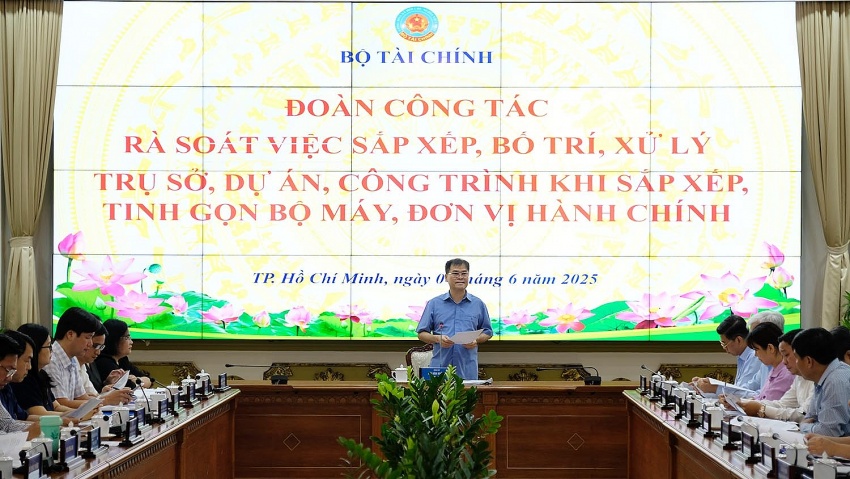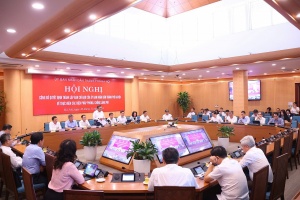Delegation examines effective handling of public assets
Those include land, buildings, and projects under construction or approved for investment, which have been affected by the streamlining of administrative apparatus and restructuring of administrative units.
 |
| A government delegation led by Deputy Minister of Finance Bui Van Khang worked with Ho Chi Minh City, Ba Ria-Vung Tau and Binh Duong on June 4 on public asset handling |
At the meeting, Khang emphasised that to ensure a solid foundation for handling public assets and offices during organisational changes, the Ministry of Finance (MoF) has taken the lead in developing and submitting to the government decrees which amend and supplement regulations on handling assets during mergers, consolidations, divisions, dissolutions, and cessation of operations.
Additionally, in fulfilling tasks assigned by the Party and government leaders, the MoF has issued official letters guiding the handling of assets during organisational restructuring, as well as the management of tasks, projects, and public investment plans impacted by administrative unit adjustments.
According to the National Inventory of Public Assets at agencies, organisations, units, and infrastructure assets invested and managed by the state, many assets remain unused or used for wrong purposes.
In a dispatch dated June 2, the prime minister ordered authorities to set up working delegations to directly guide and urge local agencies, organisations, units, and localities with a large volume of offices and complex infrastructure to accelerate the handling of public assets.
In response, the MoF established a working delegation and selected Ho Chi Minh City, Binh Duong, and Ba Ria-Vung Tau as the first units for review. The delegation will continue to work with other localities to guide them in handling public assets later.
According to a report presented at the meeting, the Ho Chi Minh City Department of Finance reported a total of 3,895 office premises and public service facilities under the city's jurisdiction, of which 3,430 remain in active use.
A total of 234 facilities have been reallocated among agencies, organisations, and units under the management of ministries, central authorities, and local governments. After administrative and organisational restructuring, 231 facilities were identified as redundant, mainly consisting of small, scattered units such as neighbourhood and hamlet offices.
In Ba Ria-Vung Tau, 142 facilities were deemed redundant after the restructuring due to unsuitable locations, lack of usage demand, or exceeding standard requirements. The local authority plans to assign these to the Land Development Centre for management and utilisation.
In Binh Duong province, there are currently 1,603 office buildings and public service facilities under management. Of these, 1,407 are still in use, while 43 have become redundant after the restructuring.
At the meeting, Khang noted that the scale of asset handling due to organisational restructuring and administrative unit adjustments is substantial, making the process complex and challenging. It requires a high level of determination and active involvement from all levels and sectors to ensure effective handling of assets and prevent losses and waste.
Currently, temporary arrangements are being made for existing offices to centralise state management tasks in the new administrative units. After the mergers, the new administrative units will review and determine areas of surplus or shortage and propose solutions for asset handling.
After listening to reports from localities, representatives from ministries, central agencies, and the MoF acknowledged the challenges and provided guidance on resolving difficulties in implementing public asset handling instructions, especially for projects, works, and offices under construction or approved for investment.
To ensure efficient and cost-effective handling of public assets and the implementation of public initiatives for office facilities, Khang urged localities to continue conducting training, providing guidance, and thoroughly implementing the directives of the Politburo, the Party Secretariat, and the PM, as well as relevant legal documents and guidelines issued by the MoF on asset rearrangement and handling.
“Local authorities should also instruct relevant agencies to review and comprehensively compile lists of office premises and public assets currently under management, along with ongoing or planned investments that have been included in the medium-term public investment plan or approved in principle but not yet implemented. Based on that, they must develop asset reallocation and handling plans and propose implementation methods for projects affected by the administrative restructuring,” Khang said.
“Importantly, the asset handling plan must be developed in parallel with the administrative restructuring plan. For redundant buildings and land, a detailed handling plan must be developed following the PM’s six clear principles: clear responsibility, clear task, clear timeline, clear accountability, clear deliverables, and clear authority. In addition, newly arising surplus facilities must be incorporated into the plan,” he stressed.
 | Hanoi strengthens measures to prevent mismanagement and wastage of public assets On November 20, Hanoi People's Committee announced the establishment of a steering committee to implement measures preventing the misuse and waste of public assets, aiming to optimise the use of social resources and state budgets. |
What the stars mean:
★ Poor ★ ★ Promising ★★★ Good ★★★★ Very good ★★★★★ Exceptional
Related Contents
Latest News
More News
- State corporations poised to drive 2026 growth (February 03, 2026 | 13:58)
- Why high-tech talent will define Vietnam’s growth (February 02, 2026 | 10:47)
- FMCG resilience amid varying storms (February 02, 2026 | 10:00)
- Customs reforms strengthen business confidence, support trade growth (February 01, 2026 | 08:20)
- Vietnam and US to launch sixth trade negotiation round (January 30, 2026 | 15:19)
- Digital publishing emerges as key growth driver in Vietnam (January 30, 2026 | 10:59)
- EVN signs key contract for Tri An hydropower expansion (January 30, 2026 | 10:57)
- Vietnam to lead trade growth in ASEAN (January 29, 2026 | 15:08)
- Carlsberg Vietnam delivers Lunar New Year support in central region (January 28, 2026 | 17:19)
- TikTok penalised $35,000 in Vietnam for consumer protection violations (January 28, 2026 | 17:15)

 Tag:
Tag:




















 Mobile Version
Mobile Version